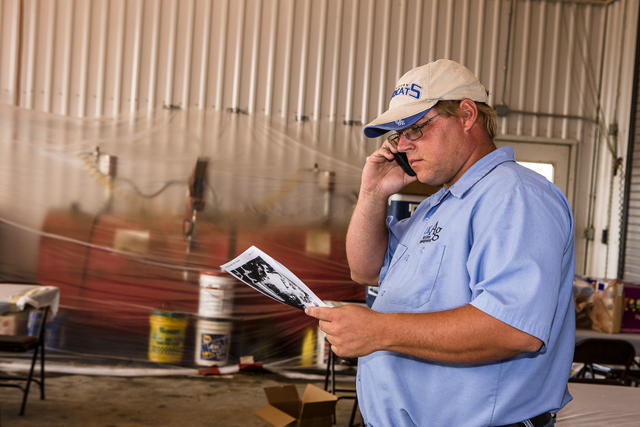Exercise prepares first responders, farm and community for real events
Exercise prepares first responders, farm and community for real events

Published on July 17, 2012
If a serious accident were to happen on a farm, the University of Kentucky College of Agriculture and the Bluegrass Emergency Response Team are now more prepared to handle it. For the better part of a year, BERT worked with college staff to stage a realistic mock accident that would set up hands-on training for the 11-county team.
The setting was the UK C. Oran Little Research Farm in Woodford County. The script had a farmworker hitting a gas line near a grain storage area with a skid steer. The event caused two mock fatalities and several mock injuries.
“The university has been a great neighbor to us,” said Keith Slugantz, director of Woodford County Emergency Management. “The possibilities of this farm that we have for future training exercises are tremendous. Farming is a big industry in this state and being better prepared (to respond to emergencies) helps all of us.”
BERT is made up of emergency responders from Bourbon, Clark, Estill, Garrard, Fayette, Harrison, Jessamine, Madison, Nicholas, Powell and Woodford counties. Slugantz said teams have different specialties including hazardous materials, rescue, natural disaster response, radiological and mass causality incidents. In fact, BERT teams were quickly on the ground March 2 in Morgan, Laurel, Magoffin and Menifee counties after strong tornadoes caused widespread damage.
Just minutes into the exercise, a real emergency occurred on the farm that caused a pause in the exercise until responders determined it was safe to proceed.
“This is an active farm, and there was an ongoing construction project near the next barn down,” Slugantz said. “They took care of it (an actual gas leak) and we started again.”
Shannon Rudd is the superintendent of the C. Oran Little Research Farm. He gave his crew as little information about the exercise as possible. They knew something was going to happen, but they didn’t find out until they arrived for work that morning that they were preparing for a very different kind of field day, Rudd said.
“Agriculture can be a dangerous industry; anything can happen,” he said. “We are so broad that you can’t prepare for every incident that could possibly occur, but we are going to be sure we can prepare for most of them. My major goal through all this was to see how my crew can respond and work with emergency responders.”
Rudd said he was pleased with the way his crew handled the scenario and he feels more confident that they could handle a real-world event.
“We spent a lot of time coming up with this scenario and tried to make it very realistic,” Rudd said. “This could really happen. We do regular maintenance on this grain leg. I’m hoping it increases awareness that we need to think about safety at all times.
Rudd said he hopes farm personnel never have to see a similar incident in real-life, but he feels prepared if they do.
“The need to have effective preparedness plans for a county is (a given), but if you don’t test it and exercise it, you’re not going to know if your plan is good,” Slugantz said. “We’re already seeing things that need to be changed; communication is always an issue with a multi-county response.”
The BERT team will put together an after-action report to identify any gaps in the response and then assign corrective action. The team will share the report with the UK College of Agriculture to enhance its preparedness as well.
Events



